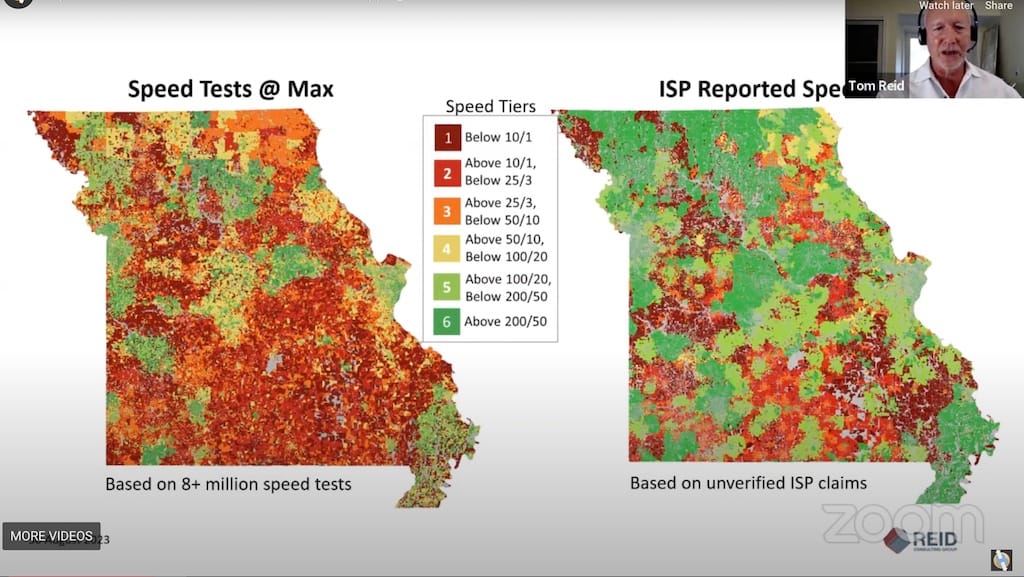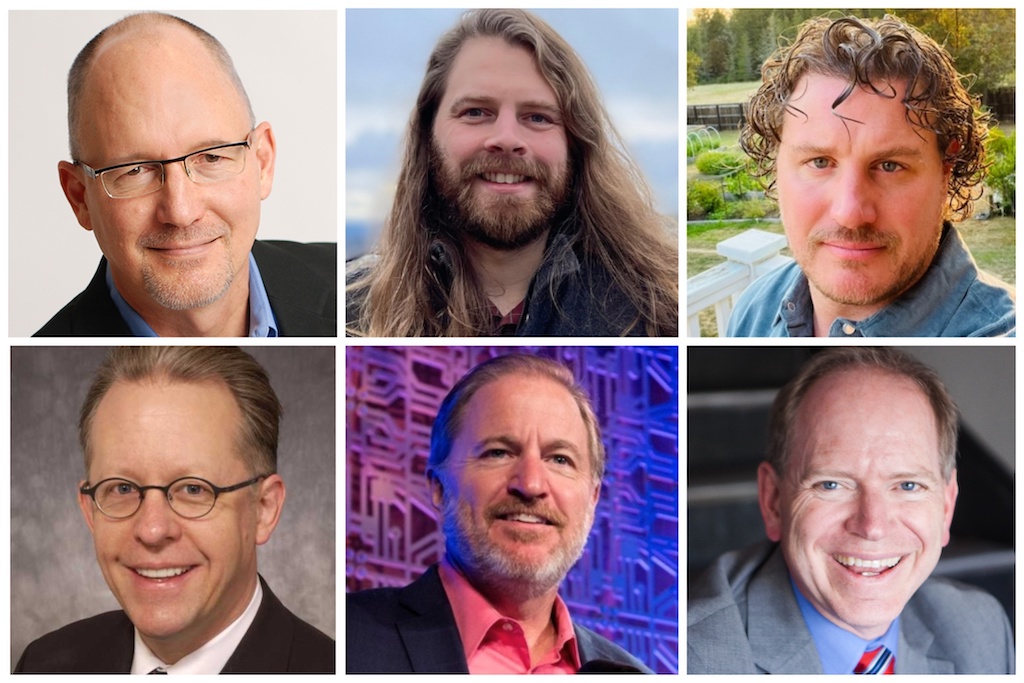Area Challenges Could be Key for State Mapping Efforts: Experts
The next phase of broadband mapping is going to be very much state-driven, said panelists.
Jake Neenan

WASHINGTON, September 6, 2023 – An optional provision in the National Telecommunications and Information Administration’s model BEAD challenge process could be key for states as they work to create accurate broadband maps, experts said on Wednesday.
The Broadband Equity, Access and Deployment Program provides states over $42 billion to expand broadband infrastructure. Part of the implementation process involves consumers and providers submitting challenges to the state’s claim on whether a location is already served with an adequate internet connection.
In the NTIA’s model challenge process – published in June as a template for states – if six or more locations in a census block group allege the same technology from the same provider is slower than state data indicates, an “area challenge” is initiated. This designates the entire block group as challenged.
Normally, the challenger must provide evidence that their service is worse than advertised in order to successfully change their location’s status in the state’s data. But under area challenges, the provider must prove that they provide the reported service to the entire census block.
“It’s really important to think about the area challenge,” Dustin Loup, director of community development at Ready, a software company that makes tools for state broadband offices and grant applicants, said at a Broadband Breakfast Live Online event.
He emphasized that the area challenge provision would allow states to collect information on areas that might be labeled incorrectly by using broadband providers’ infrastructure rather than crowdsourcing speed tests from individual consumers.
“There’s no way you’re going to be able to go out and collect data for 500 locations in a census block group,” he said. “But you can almost certainly find six willing participants.”
The Federal Communications Commission’s broadband coverage map – known as the fabric – is widely alleged to be inaccurate. That makes state and local efforts to collect accurate coverage data essential for getting BEAD-funded projects in areas that need them, according to other experts at the event.
“This is a big, big issue,” said Tom Reid, founder of broadband consulting firm Reid Consulting Group. “It is going to be very much state-driven.”
“The state challenge process is essentially an acknowledgement that the FCC maps don’t go far enough,” Loup added.
States are not required to use the NTIA’s model process, and those that do are not required to enforce the area challenge provision, but they are required to submit detailed plans for a challenge process with volume one of their initial BEAD proposals.
Those proposals are due December 27. Some states, like Virginia and Louisiana, have released these ahead of schedule and are adopting the NTIA model challenge process guidelines.
J. Randolph Luening, founder of BroadbandToolkit.com, a suite of mapping tools and datasets for state broadband providers, expressed concern that separate state methodologies could lead to more confusing about the true state of broadband coverage in the U.S.
Chris Scharrer, founder of rural broadband mapping company DCS Technology Design, emphasized the importance of requiring providers to provide evidence for their reported coverage, citing differences in ISP-reported speeds and those detected by on-the-ground testing.
Gerry Lawlor, co-founder of broadband mapping company Hexvarium, said the challenge process could end up distracting state broadband offices from working with providers to ensure coverage for the highest cost communities.

Wednesday, September 6, 2023 – What’s New in Broadband Mapping
The success of the Broadband Equity, Access, and Deployment program may hinge upon accurate data for distributing infrastructure funding. But broadband mapping remains a formidable challenge. The FCC’s broadband map has already served as the basis for state-by-state allocation decisions. But will one much-maligned tool be enough for state broadband offices as they formulate coverage areas within their states’ communities? Join a range of stakeholders for this special Broadband Breakfast Live Online as we all seek to understand the intricacies of broadband mapping through a range of software databases.
Panelists
- Tom Reid, President and Founder, Reid Consulting Group
- Dustin Loup, Director of Community Development, Ready.net. Coordinator, Broadband Mapping Coalition
- Gerry Lawlor, Co-founder, Chief Executive Officer, Hexvarium
- J. Randolph Luening, Founder and CEO, BroadbandTookit.com
- Chris Scharrer, Founder, DCS Technology Design
- Drew Clark (moderator), Editor and Publisher, Broadband Breakfast
Panelist resources:
- Tom Reid: Accountability in Broadband Maps Necessary for BEAD to Achieve Mission, Broadband Breakfast, June 1, 2023
- Broadband Mapping Coalition Seeks to Bring Openness Back to Internet Data, Broadband Breakfast, June 17, 2022
- Mapping Expert Dustin Loup Joins Ready as Director of Community Development, Ready.net, July 18, 2023
- Key Principles for the Data-driven State Broadband Office, Ready.net, July 25, 2023
- Running a Robust, Transparent, Efficient Challenge Process, Ready.net
- Ask Me Anything! with Gerry Lawlor, Co-Founder and CEO of Hexvarium, Broadband.io, June 30, 2023
- Commercial Mapping Products Positioned to Compliment, Challenge FCC Map, Broadband Breakfast, November 21, 2022
- Fiber Broadband Association Announces High Cost Area Planning Tool for BEAD Projects, Broadband Breakfast, August 21, 2023
- 45 years ago, I installed my first Broadband Coax drop!, Chris Scharrer, Broadband.io, August 20, 2023
- States must not succumb to defeatism on broadband data and mapping, Drew Clark, Broadband.io, February 12, 2023
- Broadband Maps Are a Mess, So Now Let’s Focus on Actually Improving Them, Drew Clark, Broadband Communities and Broadband Breakfast, July 30, 2019

Tom Reid, President and Founder of Reid Consulting Group (RCG) has nearly 40 years of experience in the technology sector. His experience is extensive, advising both public and private-industry clients on strategic planning, technology architecture, competitive bidding, and project management. For fifteen years RCG has been in the forefront of broadband expansion, building deep experience in stakeholder engagement, GIS mapping, engineering, and statistical analysis. RCG’s rigorous, multi-source mapping methodology can identify the true extent of broadband need in any region, providing a strong basis for state and federal investment.
Dustin Loup is the Director of Community Development with Ready.net. He also coordinates the Broadband Mapping Coalition and advises on the Digital Inclusion Leadership Program for the Marconi Society. Prior to joining Ready, Dustin served as the Broadband and Digital Equity Project Director for Washington State University Extension.
Very much the accidental telecom executive, Gerry Lawlor has started and led multiple ISPs both regionally and nationally. His broadband adventures started out of necessity after leaving Manhattan in 2011 for remote rural living on a pacific northwest island. Working with his local electric co-op, he led Rock Island Communications which has been one of the most successful Co-op led broadband initiatives. He moved to T-Mobile in 2018 and led the national development and deployment of its Fixed Wireless Access (FWA) line of business. Prior to making his mark in the telecom sector, Gerry led global businesses in the financial industry, where he developed his passion for bringing meticulous research and a unique, boundary-pushing approach to data analysis.
J. Randolph Luening is the founder and CEO of Signals Analytics, LLC and the creator of BroadbandToolkit.com, an entity that delivers powerful business planning tools to FCC auction participants and to others developing fixed or mobile telecommunication business cases. Mr. Luening has contributed to the wireless telecommunications industry as an influential industry insider over the past three decades. An expert is mobile operator economics, his areas of focus include the economics of next generation mobile networks, small cells, emerging business models, and consumer behavior. Previously as a Senior Director at Vodafone, and more recently as a consultant, his work has benefited telecommunications operators in the US, Europe, and Asia.
Chris Scharrer started in the cable industry in 1978, as an installer, and held positions in construction, operations, and engineering, eventually becoming Division VP and CIO for a major, 800-person global professional services firm. Stepping away from the corporate world in 2008, Chris founded DCS Technology Design, within the professional services industry, to bring excellence in Telecommunication Infrastructure Design for all types of intelligent building and smart community applications. With Covid, and in response to the lack of reliable and trusted ISP service area maps, DCS refocused its mission to develop methodologies that produce highly accurate Rural Broadband accessibility data, and helping Michigan municipalities locate thousands of previously missed or mis-reported homes and businesses that do not have access to Broadband and qualifying them for needed grant funding, ensuring inclusive accessibility for all residents.
Breakfast Media LLC CEO Drew Clark has led the Broadband Breakfast community since 2008. An early proponent of better broadband, better lives, he initially founded the Broadband Census crowdsourcing campaign for broadband data. As Editor and Publisher, Clark presides over the leading media company advocating for higher-capacity internet everywhere through topical, timely and intelligent coverage. Clark also served as head of the Partnership for a Connected Illinois, a state broadband initiative. As with all Broadband Breakfast Live Online events, the FREE webcasts will take place at 12 Noon ET on Wednesday.










Member discussion